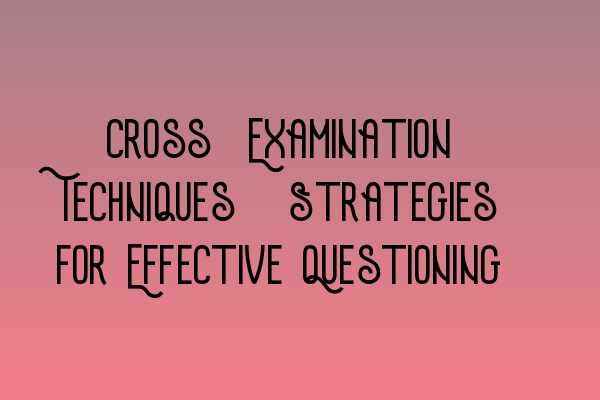Cross-Examination Techniques: Strategies for Effective Questioning
As experts in criminal law and practice at SQE Criminal Law & Practice Law UK, we understand the importance of mastering cross-examination techniques. Cross-examination is a crucial component of any legal proceeding where gathering evidence and probing witnesses is essential.
In this comprehensive guide, we will discuss effective strategies and tips for cross-examination that will help you succeed in court. Whether you are a solicitor, barrister, or aspiring legal professional, these techniques will enhance your ability to extract relevant information and challenge witness credibility.
1. Preparation is Key
Preparing for cross-examination is vital to ensure a strong and effective line of questioning. It involves a thorough understanding of the case, reviewing witness statements, and identifying areas of weakness or inconsistency.
Start by developing a clear outline of key points you want to address during cross-examination. This will help you stay focused and organized during the process. Additionally, consider practicing your questioning techniques with colleagues or through SQE 1 Practice Exam Questions and SQE 1 Practice Mocks FLK1 FLK2 to refine your skills.
2. Establish Credibility
Building credibility as a cross-examiner is essential to gain the trust and respect of the court. Maintain a professional demeanor, speak clearly and confidently, and avoid aggressive or confrontational tactics.
Show respect to the witness while also challenging their testimony. Use precise questions to highlight inconsistencies, contradictions, or biases. This will help weaken the witness’s credibility and strengthen your case.
3. Control the Witness
Controlling the witness during cross-examination is crucial to ensure they provide clear and concise answers. Avoid open-ended questions that allow the witness to provide lengthy explanations. Instead, use leading questions that elicit specific “yes” or “no” responses.
Remember to listen carefully to the witness’s answers and be prepared to follow up with additional questions. Look for opportunities to exploit weaknesses or contradictions in their testimony.
4. Use Impeachment Techniques
Impeachment techniques are useful for challenging witness credibility and revealing inconsistencies in their statements. These techniques involve confronting the witness with prior inconsistent statements, biases, or motives for dishonesty.
When presenting prior inconsistent statements, always have the original documents or evidence available for the court. This will enhance your credibility and leave no room for doubt.
5. Be Bold and Confident
Cross-examination requires assertiveness and confidence. To effectively question witnesses, you must be well-prepared and unafraid to challenge their testimony.
Be deliberate with your body language, tone of voice, and choice of words. Maintain eye contact with the witness, and clearly articulate your questions to ensure they are understood.
6. Adapt to the Courtroom Dynamics
Every courtroom presents unique dynamics, and it is crucial to adapt your cross-examination techniques accordingly. Pay attention to the judge’s preferences and any rules specific to the court.
Additionally, be mindful of the jury’s reactions and adjust your questioning to keep them engaged. A well-executed cross-examination can have a significant impact on the jury’s perception of the case.
For more in-depth preparation and training, consider enrolling in SQE 2 Preparation Courses or SQE 1 Preparation Courses. These courses provide comprehensive guidance and mock scenarios to sharpen your cross-examination skills.
Conclusion
Mastering the art of cross-examination is no easy task, but with the right strategies and preparation, it can greatly enhance your effectiveness as a legal professional. By incorporating these techniques into your practice, you will be better equipped to challenge witnesses, expose inconsistencies, and ultimately bolster your case.
Remember, effective cross-examination requires thorough preparation, credibility, control, impeachment techniques, confidence, and adaptability. By honing these skills, you will become a formidable cross-examiner who can artfully extract the truth from witnesses.
Stay up-to-date with the latest SRA SQE exam dates and other legal resources at SRA SQE Exam Dates.
